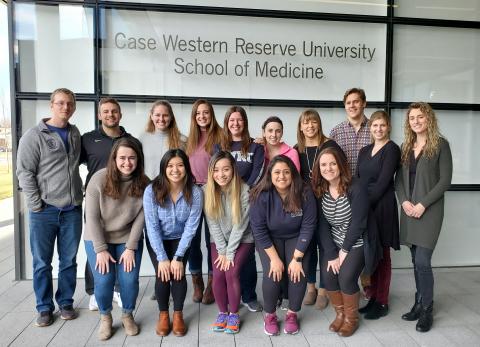Just four years after its first class of students matriculated in 2016, Case Western Reserve University School of Medicine’s Physician Assistant (PA) Program has achieved a new milestone: the program has been granted accreditation-continued status by the Accreditation Review Commission on Education for the Physician Assistant, Inc. (ARC-PA), the highest accreditation status a PA program can receive.
“Having accreditation-continued status acknowledges and confirms our PA program’s ability to deliver an innovative curriculum, enabling our students to meet the program’s diverse and comprehensive learning outcomes,” said Cindy Lord, associate professor and director of the program. “Support from our nationally-ranked affiliate medical centers, our transition-to-practice curriculum set within an interdisciplinary, team-based environment, and our strong community engagement set us apart from our competition. These factors and more help ensure our graduates possess the value-added skills that are highly sought after by today’s health care systems.”
The PA program is taught at the new Health Education Campus by faculty who are all practicing physician assistants. They benefit from team-based education alongside students in the university’s Cleveland Clinic Lerner College of Medicine, School of Dental Medicine and School of Nursing, contributing to a robust student experience that attracts strong applicants.
“As the program continues to grow and innovate under our new accreditation-continued status, we will continue to see an increase in highly qualified applicants, putting us in a league with the best PA programs nationwide,” said Lord.
Graduates from the PA program hold a Master of Science in Physician Assistant Studies, positioning them as professionals licensed to practice medicine nationwide.
“PAs have always been frontline primary care providers,” said Craig Myers, assistant professor and director of clinical curriculum. “While the PA field started in primary care, our robust generalist training has equipped our students for practice in subspecialties as well. We are like the ‘stem cell’ of the healthcare workforce, able to rapidly adapt and provide care wherever there is a need. For example, medication-assisted treatment (MAT) training enhances and provides much-needed skills to help address substance-use disorders. Since MAT’s inception, PA graduates have helped combat the national opioid crisis.”
This past May, the PA program welcomed 36 new students from across the United States. They brought an average of over 3,500 hours of prior direct patient care experience across seven different health care roles. Many were on the front lines as COVID-19 began, affording them real-life clinical experiences during the pandemic.
With a mission focused on clinical competence, medical professionalism, leadership, community outreach, cultural humility and innovation, the School of Medicine’s PA program graduates compassionate physician assistants who are prepared to increase access to care for the expanding patient population seeking medical services in Ohio and across the U.S.


